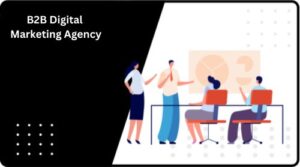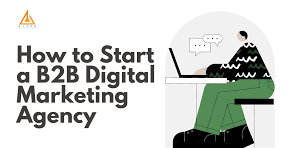In today’s rapidly evolving digital landscape, businesses are increasingly turning to B2B digital marketing agency to navigate the complexities of online marketing. These agencies specialize in crafting strategies that connect businesses with other businesses, facilitating growth and fostering valuable partnerships. However, while the benefits of collaborating with a B2B digital marketing agency are substantial, it’s essential to acknowledge and address the inherent challenges to maximize success.
Table of Contents
ToggleUnderstanding B2B Digital Marketing Agency

A B2B digital marketing agency focuses on promoting products or services from one business to another through digital channels. Unlike B2C marketing, which targets individual consumers, B2B marketing addresses the unique needs and decision-making processes of businesses. These agencies employ a range of strategies, including content marketing, search engine optimization (SEO), email campaigns, and advanced analytics, to reach and engage a professional audience.
Benefits of Partnering with a B2B Digital Marketing Agency
Specialized Expertise and Knowledge
Collaborating with a B2B digital marketing agency grants access to professionals who possess a deep understanding of business markets. They are adept at creating tailored strategies that resonate with business clients, considering the longer sales cycles and complex decision-making processes characteristic of B2B transactions.
Access to Advanced Tools and Technologies
These agencies utilize cutting-edge marketing tools that may be cost-prohibitive for individual businesses. By leveraging these technologies, they can analyze data, monitor campaign performance, and optimize strategies to achieve better outcomes.
Scalability and Flexibility
B2B digital marketing agencies can scale their services to align with your business growth. Whether you’re launching a new product or expanding into new markets, they can adjust strategies and resources to meet your evolving needs.
Enhanced Lead Generation and Conversion
Through targeted campaigns and personalized content, these agencies can attract high-quality leads and guide them through the sales funnel, increasing the likelihood of conversion and boosting revenue.
How to start a B2B Digital Marketing Agency

Define Your Niche
- Focus on a specific industry or service to differentiate yourself (e.g., SaaS companies, healthcare, or manufacturing).
- Specializing helps you develop tailored strategies and expertise.
Build Your Expertise
- Gain knowledge in B2B marketing strategies like SEO, content marketing, PPC, and LinkedIn campaigns.
- Stay updated on trends and tools through certifications and courses.
Create a Business Plan
- Outline your services, target audience, pricing models, and revenue goals.
- Plan for staffing, tools, and technology investments.
Set Up Your Business
- Register your agency, get licenses, and choose a name that reflects your niche.
- Build a professional website showcasing your services, case studies, and client testimonials.
Develop a Portfolio
- Offer free or discounted services to initial clients to build a strong portfolio.
- Highlight measurable results like increased leads or improved ROI.
Invest in Tools and Technology
- Use CRM, analytics, email marketing, and automation tools to streamline operations.
- Leverage platforms like HubSpot, Google Analytics, or SEMrush for effective campaigns.
Market Your Agency
- Use your expertise to market your agency through content creation, LinkedIn networking, and paid ads.
- Publish blogs, case studies, and thought leadership content to attract B2B clients.
Build a Team
- Hire specialists like content creators, SEO experts, and PPC managers.
- Focus on assembling a skilled and reliable team.
Generate Leads and Clients
- Use networking, referrals, and outreach emails to connect with potential clients.
- Attend industry events and offer free consultations to showcase your value.
Deliver Results and Scale
- Focus on delivering measurable outcomes for your clients.
- As your agency grows, expand your services and invest in scaling operations.
By following these steps, you can establish and grow a successful B2B digital marketing agency.
Challenges Faced by B2B Digital Marketing Agencies
While the advantages are compelling, B2B digital marketing agencies encounter several challenges that require strategic solutions:
Adapting to Evolving Buyer Behavior
The B2B buying process has transformed, with buyers conducting extensive online research before engaging with suppliers. Agencies must stay abreast of these changes and develop strategies that effectively reach and influence informed buyers.
Generating Quality Leads
Identifying and attracting high-quality leads remains a significant challenge. Agencies must implement precise targeting and compelling value propositions to engage potential clients effectively.
Measuring Return on Investment (ROI)
Demonstrating the ROI of digital marketing efforts can be complex due to longer sales cycles and multiple touchpoints. Agencies need robust analytics and reporting tools to provide clients with clear insights into campaign effectiveness.
Maintaining Consistent Messaging Across Channels
Ensuring a unified brand message across various digital platforms is crucial yet challenging. Agencies must coordinate content and campaigns to maintain brand integrity and reinforce trust with the target audience.
Strategies for Overcoming Challenges

To navigate these challenges, B2B digital marketing agencies can implement the following strategies:
Investing in Continuous Learning and Adaptation
The digital marketing landscape is ever-changing. Agencies should invest in ongoing education and training to stay ahead of industry trends and technological advancements.
Implementing Data-Driven Decision Making
Leveraging data analytics enables agencies to make informed decisions, optimize campaigns in real-time, and allocate resources more effectively, thereby enhancing ROI.
Developing Comprehensive Buyer Personas
Understanding the target audience through detailed buyer personas allows agencies to create personalized and relevant content that resonates with potential clients, improving engagement and conversion rates.
Utilizing Integrated Marketing Platforms
Employing integrated marketing platforms can streamline campaign management, ensuring consistency across channels and providing a holistic view of marketing performance.
Case Studies Illustrating Success and Challenges
Examining real-world examples provides valuable insights into how B2B digital marketing agencies have navigated challenges to achieve success:
Blend’s Content Strategy
Blend, a FinTech company, sought to position itself as an industry expert. By scaling their content marketing efforts, they achieved a 183% increase in site traffic, demonstrating the effectiveness of targeted content in driving engagement.
Lucidworks’ Interactive Microsite
To educate their audience about complex data topics, Lucidworks developed an interactive microsite. This innovative approach made the subject matter more engaging, enhancing user experience and knowledge retention.
Cyber Security Company’s Lead Generation
An emerging cyber security company partnered with a B2B digital marketing agency to enhance their online presence. Through a comprehensive digital strategy, they increased opportunities by 900%, highlighting the potential for significant growth through effective digital marketing.
Conclusion
Partnering with a B2B digital marketing agency offers businesses the opportunity to leverage specialized expertise, advanced tools, and tailored strategies to achieve their marketing objectives. While challenges exist, a proactive approach that includes continuous learning, data-driven decision-making, and personalized content development can overcome these obstacles. By examining successful case studies, businesses can gain insights into effective strategies and the potential for growth in the dynamic realm of B2B digital marketing.
